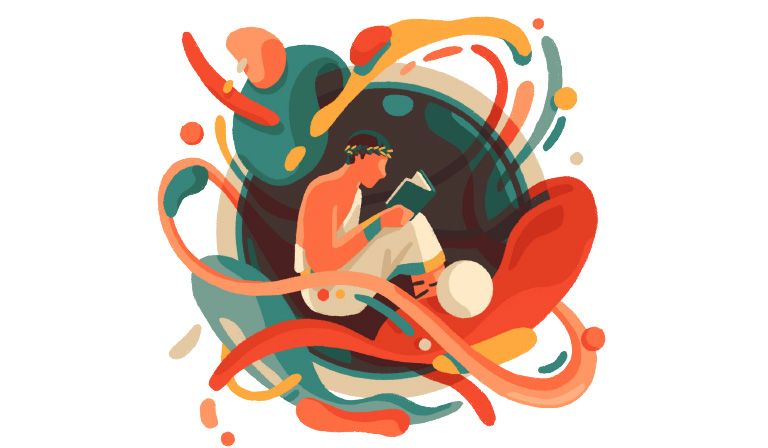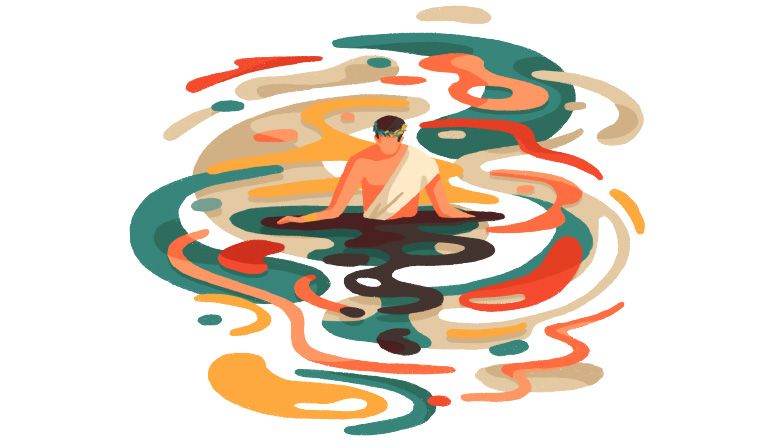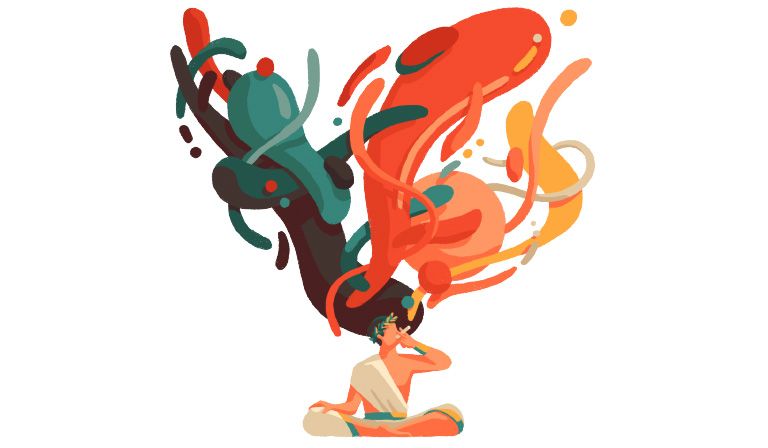
Prozac or Presocratics?
“If you look at the matter from a theoretical point of view and ignore this question of degree you can very well say that we are all ill,” wrote Freud in his Introductory Lectures on Psychoanalysis. By “ill”, he clarified, he meant “neurotic—since the preconditions for the formation of symptoms can also be observed in normal people.”
The trouble is, instead of remaining exclusive to practitioners and theorists of psychology, the “theoretical” viewpoint Freud referred to has become commonplace. The whole of life has been pathologised; we are always on the hunt for remedies. Tea, bubble bath, Mediterranean tours, books—the chief selling point of any of them is that they are “healing”. In any chemist, practically all the shampoo bottles have labels indicating which specific type of “problem hair”, out of a vast range, they each tackle. It’s often hard to find one for “normal hair”. Freudianism as such may have ebbed, but Freud’s we-are-all-ill idea has certainly stuck.
Of course, the sense of being somehow faulty and awry is an immemorial part of the human condition. It is just that, since secularisation in the 19th century, many of us lack the sense that there is a Divine Physician to cure us, or an ordered cosmos that we do, or could, fit into. Now we are on our own. When Samuel Smiles’s Self-Help was published in 1859—the same year as Darwin’s On the Origin of Species and Mill’s On Liberty—it was much derided, and still is, but it spawned the genre of “how to change your life and live better”.
In the last decade or so, a new genre of self-help books has arisen, ones that combine therapy with philosophy. Almost more than “mindfulness”, which poaches from yoga and eastern philosophies, it’s the philosophy of ancient Greece and Rome that now predominates in the sections devoted to “Mind, Body, Spirit”—all three require “healing”—in libraries and bookshops. Classical philosophy can happily be invoked in a secular era since it did not prioritise the gods or God, even when, as with Stoicism, a divinity was presupposed.
Illustration by Priya Mistry
And so these classical self-help books are proliferating, with several published, or set to be published, just this year—including Emily Austin’s Living for Pleasure: An Epicurean Guide to Life, Adam Nicolson’s How to Be: Life Lessons from the Early Greeks, and Alexandros Kosmidis’s Resurrecting the Wisdom of the Ancients: Ancient Greek Philosophers and their Relevance in the Modern World. In June, there was even a new, abridged translation of Aristotle’s Nicomachean Ethics, published under the title How to Flourish: An Ancient Guide to Living Well.
Some of the authors in this hybrid realm are professional philosophers aiming to make a particular philosopher or theory “accessible” or “relevant”; others start out from the other end, with self-help. Jules Evans wrote one of the first and most popular of these hybrid books, Philosophy for Life and Other Dangerous Situations (2012). What drew him to Stoicism was undergoing cognitive behavioural therapy (it “literally saved my life”), which, he then discovered, is derived from that Hellenistic school of thought. Ryan Holiday, who has written a range of Stoic-invoking books (such as Discipline is Destiny: The Power of Self-Control) runs The Daily Stoic website. The Stoic Yahoo! discussion board and an online Stoic school were founded by a former parole officer in San Diego.
The Stoics are perfect candidates for self-help philosophy: their principal concern was how to live and how to face life’s misfortunes. Even to speak of “misfortunes” is mistaken, they argued—it is not what happens to us that disturbs us, but, rather, the way that we consider and respond to it. (After all, an event that devastates you is not objectively devastating; it is a matter of indifference to almost everyone else.) If, then, we manage to judge events in the context of the cosmos, without making ourselves its centre, we will succeed in avoiding anger, sorrow and fear, and attain ataraxia (a state of tranquillity).
Classical philosophy can happily be invoked in a secular era since it did not prioritise the gods or God
“What makes us think we are the universe’s special darlings, or ought to be?” is how Massimo Pigliucci phrases it in How to Be a Stoic: Ancient Wisdom for Modern Living (2017). As well as expounding Stoic theories, Pigliucci offers a chapter of “Practical Spiritual Exercises”, quoting the Stoic suggestion for the right response to being wronged (“I too have before now committed the offence I am complaining of”) and citing Epictetus’s advice for how to greet criticism (“Yes, and he [the critic] doesn’t know the half of it, because he could have said more”).
John Sellars’s Lessons in Stoicism: What Ancient Philosophers Teach Us About How to Live (2019) also—as the cover’s comment from a respected classical philosopher says— “excellently shows why Stoicism is the philosophy for our time”. Sellars guides us through Seneca’s three-stage account of emotion—from the involuntary and unavoidable “first movements”, which are simply physical reactions to an external event, through judging the event in a non-disinterested way (thus becoming what Epictetus calls “complicit in the provocation”), to being “carried away” by a negative emotion. Judging appropriately at the second stage stifles the emergence of full-blown emotion, and, over time, the Stoic becomes emotion-free (has apatheia).
From this year, Emily Austin’s Living for Pleasure: An Epicurean Guide to Life looks at the ideas of Epicurus and how to apply them, which (we shouldn’t be misled by the current meaning of “epicurean”) would not involve riotous self-indulgence. Like the Stoics, Epicurus sought ataraxia, and he advocated pleasures in so far as they can culminate in overall flourishing. He allowed for “natural and necessary desires”, even, within reason, “extravagant desires” (ones for things we don’t, strictly speaking, need), but not “corrosive” ones (for power, privilege, wealth or—Austin’s example—pursuit of perpetual youthful beauty), since these are unstable and foster envy, flattery and competitiveness. Via Epicurus, Austin discusses the nature of happiness.

Illustration by Priya Mistry
Pigliucci, Sellars and Austin are all philosophy professors, and manage to combine accessibility with scholarliness, interlacing practical examples with assiduous exposition and meticulous citations. But, especially when done by non-philosophers, does bracketing philosophy with self-help run the risk of diluting it and making it glib?
Such a question could be considered snooty and precious. After all, didn’t philosophy start out, somewhat like self-help, as musings on our lives? But that actually isn’t how philosophy started out. “Love of wisdom” in the 6th century BC was initially, until Socrates, speculation on the nature of the world. Because the Presocratics were proto-scientists, the theoretical physicist Carlo Rovelli is on firm ground in his appropriately titled Anaximander and the Nature of Science (recently, and for the first time, made widely available in English), which manages to convey Anaximander’s originality and how he anticipated and embodied the scientific project: awareness, and pursuit, of “more natural entities than what we directly perceive.”
In the scanty remaining fragments of Anaximander, Rovelli detects not only proto- but also genuinely scientific principles: that an initial amorphousness (the apeiron) must be envisaged from which entities emerge and become discrete; that the constant transformations of one thing into another have regularity and necessity; that since humans are not self-sufficient in infancy, they could not have originated in their current form, but must once have been fishlike inhabitants of the sea that eventually moved onto land.
That Anaximander here anticipates Darwin (as Rovelli hints) is irritably dismissed by many evolutionary scientists, but Rovelli can authoritatively trace the “descendants” of Anaximander’s other ideas in Faraday’s and Maxwell’s electrical and magnetic fields, Einstein’s curved space-time, Gell-Mann’s quarks, Feynman’s virtual particles and the wave function of Schrödinger’s quantum mechanics. All these, he says, rather than being directly perceptible by the senses, are “theoretical entities” with “precisely the same role and same function as the ones assigned to the apeiron by Anaximander”.
It is of course refreshing to break down the boundaries between disciplines and dilute the specialisation that excludes the non-specialised reader. Rovelli’s expertise in physics and in the communication of the sciences are well suited to expounding Anaximander. So why shouldn’t authors in the therapy-philosophy genre apply the same principle to the history of the human self? After all, rather than investigating “mysteries our minds can’t resolve”, Socrates (as his student and biographer Xenophon wrote) preferred to tackle “human problems” and saw philosophising as a training in virtuousness.
Yet it was to a training in argument that Socrates (as recorded or invented by Plato, anyway) was more intensely dedicated. “The unexamined life is not worth living,” he’s said to have said, but the examining needs to come first—investigation of what virtue, courage and integrity actually are. And, although the sciences gradually split off from philosophy as separate disciplines, philosophers continued to speculate on reality as a whole and humanity’s place in it. Why then assume, as some authors of hybrid self-help/philosophy books do, that the only way to make philosophy relevant is to make it all about our aching individual selves? In any case, we (or, rather, our then-counterparts in classical Greece and Rome) weren’t quite selves as we have since become.
Adam Nicolson’s new book looks at various Presocratics who were, he claims, identifying and exalting “the thinking mind”. A well-respected historian, Nicolson has added another fashionable ingredient to the mix. How to Be: Life Lessons from the Early Greeks is also a travelogue based on the author sailing round Greek islands, describing their geography, history, artefacts and ruins in relation to the ancient philosophers (and also the poet Sappho) who lived in Smyrna, Aeolis, Miletus, Ephesus, Lesbos and so on, between 650 and 410 BC.
But there is a mismatch between the book’s title and its content. What lessons about living do (or possibly could) we glean from the Presocratics? To say they were celebrating “the thinking mind” is anachronistic; projecting onto 2,000 years of variegated terms and concepts our current notion of subjective cognitive and sensory consciousness. Perhaps that notion was incipient in Heraclitus’s “psyche”, but for Thales psyche was more a moving force, and it still had that sense even by the time of Aristotle. Meanwhile, “nous”, the term used by Parmenides, is closer to “intellect” or “reason”. Similarly, although Nicolson is generous in expounding etymology, he ignores the multiple meanings of “logos”, translating it merely as “word”. Worse, he speaks of Plato’s “ideas” in the post-Descartes sense of that word, as if they were mental states and/or constructed concepts—rather than (as generally interpreted) eternal archetypes transcendent of human thought. It is precisely to avoid this anachronism that “idea”, in Plato’s works, is now translated “Form”. Once made distrustful of Nicolson’s philosophical scholarship, the reader might go on to question his reliability in archaeology.
He certainly intends to convey that philosophical theories are anchored in a particular time and place. After would-be delightful purple passages on sea, seashore and city, he rhetorically demands: “[S]hould one be surprised that Thales [the first of the Presocratics] thought liquidity the underlying fact of the world?” Well, according to that reasoning, the other Presocratics he discusses (all of whom lived beside the sea) should also regard water as the world’s underlying principle. He portentously and incessantly intones that all of them have “harbour minds”, but—whatever that might amount to—how is it supposed to manifest in their disparate theories? And why should the fact that their cities were part of a trading nexus distinguish their way of thinking from that of virtually everyone else in the world?

Illustration by Priya Mistry
Anyway, even while attempting to derive various Presocratic ways of thinking from the respective habitats of the Presocratic philosophers, Nicolson (in his anachronisms) fails to respect what they were really trying to say when they said it. He is surely guilty of “presentism”: subsuming exploration of the past to the vocabulary, concepts and sensibilities of the present. In an era when we all insist on diversity, it seems odd to try to assimilate non-Western, non-modern theories into a digestible pabulum that can easily be grasped, approved and absorbed here and now. Surely a historian, especially, should avoid this temptation.
How much does anachronism matter? Bertrand Russell in The Problems of Philosophy (1912), Thomas Nagel in What Does It All Mean? (1987) and John Sellars in this year’s Aristotle: Understanding the World’s Greatest Philosopher all lucidly convey important, difficult ideas without distorting them. AC Grayling’s Philosophy and Life, also from this year, invites us to ask “the Socratic Question” about how to live, and examines what philosophers have said about happiness, death, love, luck, evil, duties and living among others. He succeeds in interweaving the past with the present, doing justice to the specificity of the philosophers’ times and places while making their ideas alive and—yes, all right—relevant. If only all such books were so successful. Too often, the effort to reilluminate thinkers of the past only succeeds in blurring their precision and their situatedness in an era—and falling into generalised whimsical blather.
“Philosophy is certainly the medicine of the soul,” wrote Cicero, a Stoic ally. But the Stoics’ self-doctoring was not just aimed at achieving ataraxia; ultimately, ataraxia itself was a means to something else—ennoblement of character, living in harmony with a rational universe. Present-day self-cures seem designed to achieve feelings of peacefulness purely for their own sake, and we sidestep virtue, which seems an antiquated concept; we’re more inclined to recommend behaving “appropriately”. And few of us believe what the Stoics presupposed: that the universe is ordered and beneficent. For us, Stoicism is a remedy against absurdity on a par with Prozac or beta blockers. Our supposed pursuit of Stoicism anachronistically ignores the true goal of their philosophy.
Since 2012, says John Sellars, more than 20,000 people have participated in a global online experiment on whether living like a Stoic for a week improves their sense of well-being. Apparently (and almost counter-intuitively), it produces “zest, a feeling of energy and enthusiasm for life”. Jules Evans’s journalese anecdotes in Philosophy for Life: And Other Dangerous Situations (2013) (“Rhonda Cornum was working as a flight surgeon in the 10th Airborne Division during the First Gulf War in February 1991, when…”; “Today, Brett is happily married…”) often make it seem that he was writing to advertise Stoicism.
But, like Pigliucci and Sellars, Evans was aware of Stoicism’s shortcomings—chiefly, that the Stoics tended to be solipsistic in their cultivation of virtue, and to be self-obsessed in the very effort not to be. They were right that reacting angrily to someone else’s insult or irritation often escalates the anger in each of you, yet not reacting with anger can also be inappropriate (in both the earlier and current meanings of that word). Other people are not, after all, events, and to regard them as similarly external and impermeable is dehumanising, inadequate and also imprudent. We are porous to one another; interaction changes us. As feminism and other activisms emphasise, not to angrily resist oppression is to breed tyrants. Stoic passivity sanctions the status quo.
Eventually, what really turned Evans into “a recovering Stoic” was the insistence on maintaining self-mastery. He ended up resuming his previous pursuit of ecstasy and, five years after Philosophy for Life, wrote The Art of Losing Control about (often drug-induced) visions, festivals and religious orgies. If what self-help and philosophy seek is a state of mind, why not get their beneficial effects without any of the work? There is now a fashion for “how to” books on hallucinogenic drugs and their remedial effects. How to Change Your Mind, written in 2018 by Michael Pollan, became a New York Times number one bestseller.
But perhaps we would do better to abandon self-medication—at least of the mind. As well as opining that “we are all ill”, Freud, in another telling metaphor, seemed almost to reverse that opinion. In 1909, greeted by cheering crowds as he stood on the deck of a ship entering New York harbour, he observed, rather as Dracula might have done on arriving at Whitby: “They have no idea that we are bringing them the plague.” Continual self-scrutiny perhaps only serves to inflame self-unease. Of course, it’s impossible to tell, as we can’t view counterfactual worlds, but self-help doesn’t seem to have helped us much.







